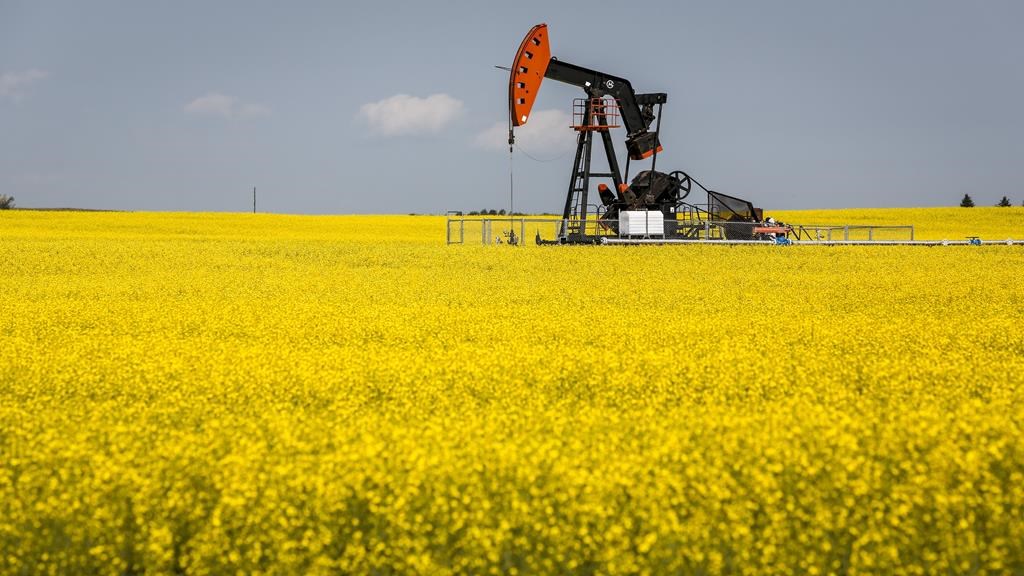The organization representing Canada’s oil and gas drilling sector is asking the federal government to create a new tax credit it says it needs to help the industry decarbonize.

The Canadian Association of Energy Contractors (CAOEC)–which represents drilling rig and service rig companies across Western Canada, as well as offshore drilling rigs in Atlantic Canada–is lobbying the government for a 50-per-cent-refundable tax credit for drillers seeking to develop and deploy new carbon abatement technologies.

“Our members have technology they could deploy in a very short amount of time,” CAOEC president Mark Scholz told reporters in Calgary Wednesday, following the organization’s annual state of the industry event.
“The challenge for our industry is there’s a lack of capital interest in the energy services space … We’re excited about the future, but we need support to get there.”
As the heaviest-emitting sector in the country, the oil and gas industry is under pressure to rapidly reduce its greenhouse gas emissions as part of Canada’s commitment to reaching net-zero by 2050.
While a formal cap on emissions from the oil and gas sector is still in development, the federal government stated in its Emissions Reduction Plan earlier this year that it believes the industry can slash its emissions by 46 per cent from 2019 levels, to 110 million tonnes, by 2030.
So far, the major oilsands companies have received most of the net-zero limelight, with their massive proposed carbon capture and storage network they say would trap emissions from oilsands sites in northern Alberta.
But Scholz said the conventional drilling sector is also willing and able to do its part, adding there are many technologies already in existence–such as hydrogen-powered rigs, fuel-switching technology and on-site carbon capture–that could be used.
However, he said his industry is only just now recovering from a brutal seven years of oil price downturn and layoffs. While that streak finally snapped in 2022, with a return to soaring oil prices and steady drilling activity, the industry is just starting to see significant levels of capital investment again.

Get breaking National news
“I wouldn’t describe our industry as profitable or sustainable yet. We will get there. The challenge is we have a 2030 target of reducing emissions,” Scholz said. “We’re going to need government collaboration to get there.”

The federal government has already unveiled an investment tax credit for carbon capture and storage projects, and Scholz said he was encouraged by Finance Minister Chrystia Freeland’s fall economic statement, which proposed a refundable tax credit for investments in clean technology.
He said a tax credit specifically for drillers would also help energy service providers pivot towards work in the alternative energy space.
“My members now are not only drilling for hydrocarbon resources, they’re drilling for lithium, they’re drilling for geothermal, for helium,” Scholz said.
“They’re going to continue to drill for natural gas, which is going to be the feedstock for the hydrogen industry. You cannot have a successful transition or transformation of our energy system without our members.”
The CAOEC said it expects 6,409 wells to be drilled in Canada in 2023, an approximately 15 per cent increase from 2022.
Scholz said Canadian energy prices are up amid global economic uncertainty and the war in Ukraine.
“As we see the turmoil around the world, energy is very important, particularly reliability, accessibility and affordability. And so Canada has a huge opportunity to really showcase itself on the world stage,” said Scholz.

The CAOEC said Wednesday it predicts 42,350 people will be employed directly and indirectly by the drilling sector in 2023, an increase of more than 5,400 jobs year-over-year.
Industry members are also expecting a boost next year from the completion of the Trans Mountain pipeline expansion and the Coastal GasLink project, both of which will increase Canadian oil and gas capacity.
“This is a good time to be in the industry, for those who stuck around in the bad times,” said Mike Belenkie, president and CEO of Advantage Energy Ltd., in a panel discussion at Wednesday’s industry event.
“We took a lot of lumps during the down times, but since then everyone has repaired their balance sheets, and most of us now are in a spot where we’ve never been stronger.”
Labour recruitment and retention remains a challenge for the energy sector as a whole, and oil prices remain volatile. Still, many industry members say they feel more optimistic than they have in a long time.
“The last seven years have been very, very difficult,” said Jason Jaskela, president and COO of Headwater Exploration Inc.
“The industry’s finally fun again.”

“The last seven years our industry has just been really decimated and it’s starting to grow. We’re seeing some sustainable growth patterns which I think will, over time, lead to attraction of labour, as we have a very ambitious, clean technology ambition and the future growth in the sector looks very bright,” said Scholz.
Alberta Premier Danielle Smith said in a keynote address to the industry group Wednesday that her government will always have their backs when it comes to what she describes as overreach by Ottawa.
She said the federal environment minister may be getting the message as Steven Guilbeault wouldn’t agree to phasing out fossil fuels at COP27.
“He said he could not sign onto that final communique because it talked about phasing out of oil and natural gas. And because natural resources are provincial jurisdiction, they would face legal challenge if they did that and they probably would not win,” said Smith.
“So when we assert our right to develop our natural resources, the federal government has to listen. They’re beginning to get the message.”








Comments
Want to discuss? Please read our Commenting Policy first.